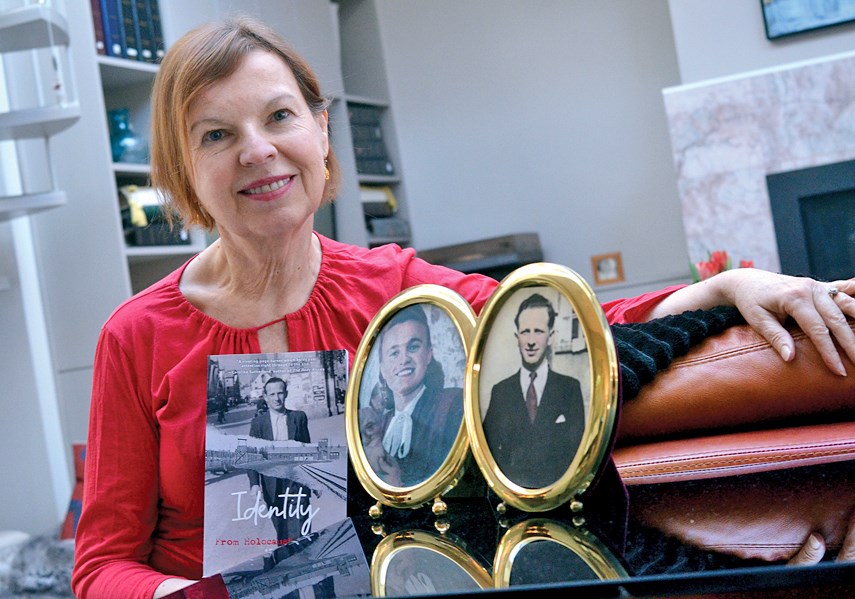In 2017, Babicki, a longtime West Vancouver resident, got her first chance to tell that story with the publication of Übern Ozean in her native Germany.
And with a new translation set to publish, Babicki is now ready for English-speaking readers to learn about her family’s tale of survival during the Nazi regime, the lingering effects of post-traumatic stress disorder and ultimately, finding the will and resolve to move on.
Babicki’s memoir, Identity: From Holocaust to Home, will launch in English on Jan. 27 to coincide with International Holocaust Remembrance Day.
A family separated
Babicki’s tale starts on her mother’s side. In 1937, before the Second World War had started but as the tides of conflict were inching closer, Babicki’s German grandfather, Johann, was taken from his wife and small children by the SS and carried off to the concentration camp in Dachau.
Johann was a conscientious objector who protested Hitler and the rise of Nazism, and was outspoken about his disdain for the authoritarian regime, according to Babicki. He was incarcerated for two years.
“As a result, the family really suffered greatly. They had no bread-winner. It was really, really difficult for the family to juggle,” she says.
Babicki’s grandmother had to work as a seamstress – as well as a psychic – in order to make ends meet while her husband was away. And Babicki’s mother, Tilly, was forced to drop out of school at 14 and take an apprenticeship in a grocery store to help the family as well.
Things got worse. By 1940, Johann was released from Dachau – but was promptly forced into conscription to the front lines of the German war effort in Africa.
Johann suffered three gun wounds – in the lung, the stomach and the shoulder – while on the battlefield against his will.
“They were ... cannon fodder,” says Babicki. “He never really recovered.”
Johann died in the early 1950s as a result of his injuries.
But before he passed away, he did play a role in connecting Tilly, his daughter, with a young man who had recently gone through an ordeal of unimaginable horror.
Surviving the impossible
Alex, Babicki’s father who would end up marrying Tilly, was from a well-off and educated family in a small town in Poland. He was Jewish, and lived in a part of the country that had a long-established Jewish community.
In 1940, the Gestapo entered the town and rounded people up. They shot his family’s three German Shepherds and separated Alex from his parents and five siblings. Like cattle, they were shipped to various concentration camps around Europe, according to Babicki.
Alex never saw most of his family again, even after the war. “He couldn’t find them anywhere,” she says.
For the rest of the war, Alex was moved around like cargo to various sites, from Mauthausen concentration camp to a satellite of Flossenburg concentration camp by the end of the war. He was 15 when he was first taken.
Horrifically, six weeks before the Allies declared victory in Europe in 1945, Alex forced himself to hide under a pile of bodies in order to avoid being shipped off to one last concentration camp – and what would have likely resulted in his execution along with other victims of the holocaust.
Alex escaped. He found refuge with a sympathetic farmer. He ended up in Straubing, Germany, where “after the war there was an active scene to help people,” says Babicki.
Her grandfather, injured as he was, was one of those people intent to help reunite displaced peoples, holocaust survivors, and other victims of the war.
Alex and Tilly eventually met, and Elke Babicki was born in 1954.
While Alex, Tilly and their new family had many wonderful years together, it was not without its challenges, which is a major focus of Babicki’s memoir.
Alex never returned to Poland following the war. After escaping one totalitarian regime in Germany, a new communist authoritarian government sprouted in its place in Poland. He remained in Straubing with his new family, but the psychological toll of the war and the atrocities he endured remained as well.
“History repeated itself and I ended up leaving school to essentially help my mother manage the store,” explains Babicki. “[My book] was driven mostly by my father and looking at life-meaning, resilience and determination. How do you steer your life when you’re losing everything?”
A fresh start
Babicki took control of her own life in 1976, when she moved to Toronto for school. She has lived in Canada since then, and been a North Shore resident since ’91. She’s worked as a private practice counsellor for the last 25 years.
But throughout that time, the idea of sharing her family’s story – her story – has always been at the back of her mind.
“I always had a feeling that this was a mission I had to fulfil,” she says.
While her memoir outlines horrors and challenges that may seem unimaginable, there’s also a lot of hope, despite the destruction that evil forces wrought on her family which resulted in years of PTSD for many.
“But they did what they could to rally to new expectations,” she writes of her parents in the introduction to her book. “Their ability to overcome taught me to persevere, to draw strength, to show courage, to be daring, to look forward, to listen to my intuition and gut instinct and to trust carefully chosen people.”
Visit Babicki’s website to learn more about her life and her new book. Identity: from Holocaust to Home is currently available through Amazon Canada.



